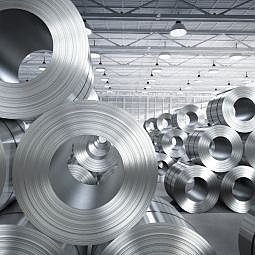
For manufacturing, aluminum is one of the most common materials for various applications. From its lightweight characteristics to its corrosion-resistant properties, aluminum offers manufacturers countless possibilities due to its malleability and cost effectiveness. To further highlight this material's benefits, let's explore the most common applications of aluminum in manufacturing.
As automotive technology continues to evolve, manufacturers are constantly looking for ways to improve fuel efficiency and reduce vehicle weight. One solution that has gained popularity in recent decades is using aluminum in automobile production. This lightweight metal offers numerous benefits, including improved fuel economy, better handling, and increased durability.
Today, aluminum is in various automotive components, from engine blocks to body panels. With aluminum's numerous benefits, it's no wonder it has become such a mainstay in the automotive industry.
Aluminum's role in construction and building materials has brought significant changes in the industry, transforming how we approach modern architecture. With aluminum's lightweight and durable properties, it has become a key material in everything from aluminum structural framing and roofing systems to window frames and curtain walls. Builders and architects alike have come to appreciate the versatility of aluminum and its ability to withstand harsh weather conditions.
Additionally, aluminum is an eco-friendly option that you can recycle repeatedly without damaging its quality. As cities become more densely populated and space becomes scarcer, aluminum's versatility and accessibility make it a go-to material for innovative designs that require both a modern and practical approach.
Aluminum is an indispensable material in the aerospace and marine industries. This lightweight metal has excellent mechanical properties and can withstand harsh environmental conditions. Because of these qualities, aluminum is in everything from airplane frames to boat hulls.
Aluminum accounts for a significant percentage of the total weight of most modern aircraft and ships. Without it, these industries would struggle to maintain their efficiency and cost effectiveness.
Although highly versatile, aluminum faces increasing competition from other lightweight materials like carbon fiber and titanium. Nevertheless, aerospace and marine industries will likely remain heavily reliant on aluminum for the foreseeable future.
The electronics industry has been using aluminum for decades, and it's no mystery why. As one of the most abundant elements in the Earth's crust, aluminum is widely available in addition to being an excellent conductor of heat and electricity. Therefore, it delivers exceptional performance in various electronic devices. Also, as we mentioned, it is easily recyclable, making it an incredibly sustainable material for high-volume electronics manufacturers.
Because of its exceptional properties, aluminum is a go-to material for all sorts of electronic devices—from smartphones and laptops to bigger equipment. It is important in the electronics industry's continued advancements and innovations.
The food packaging and processing industries rely heavily on aluminum products to keep them fresh, safe, and aesthetically pleasing. Aluminum is a versatile metal that manufacturers can mold into various shapes and sizes, making it ideal for containers, foil, and trays. Its nontoxic nature and ability to block out light, moisture, and air make it an excellent barrier material for preserving food quality and flavor.
Additionally, as we've mentioned, aluminum products are lightweight, durable, and recyclable, making them an environmentally friendly option for companies looking to reduce their carbon footprint. As demand for sustainable and convenient food packaging continues to grow, it's clear that aluminum products will continue to play a vital role in the food industry.
In addition to its diverse applications in other industries, aluminum plays a crucial role in the medical industry. Its nontoxic nature and ability to withstand extreme conditions make it a popular choice for various medical devices, such as pacemakers, prosthetics, and surgical instruments.
Aluminum's strength-to-weight ratio is particularly important in the medical field, as lightweight materials can enhance the mobility and comfort of patients. Notably, aluminum is also popular for dental implants and braces due to its biocompatibility and strength.
Furthermore, aluminum can be anodized, resulting in a hard, scratch-resistant surface that increases corrosion resistance and makes it suitable for medical equipment that requires frequent sterilization. Its widespread use in healthcare continues to make aluminum a crucial material in the medical field.
While aluminum is incredibly versatile and offers a range of benefits in various manufacturing applications, it is also essential to weigh the pros and cons of the material.
We've already discussed the following pros, but reiterating them for direct comparison with the cons is helpful:
The most common applications for aluminum in manufacturing demonstrate how it's a multiuse and versatile material that greatly benefits manufacturers. Its wide range of properties makes it ideal for various applications, including construction, electronics, and food packaging. Furthermore, aluminum's environmental benefits and sustainability continue to make it a go-to material for companies worldwide. With its continued advancements in production technology, the future of aluminum in manufacturing looks very bright.
A-Line Automation specializes in aluminum structural framing for manufacturing that can transform your manufacturing facility's operations. Our commitment to using high-quality aluminum extrusions ensures durability and strength for industrial applications. We offer a range of customizable solutions, including workstations, machine guards, enclosures, and trolleys. Contact us today to learn more about how our aluminum framing solutions can streamline manufacturing processes and improve efficiency.